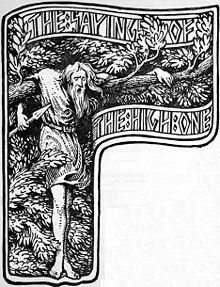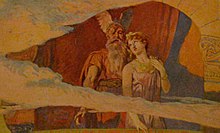List of knowledge deities

Odin sacrificing himself to gain knowledge of the runes.
A knowledge deity is a deity in mythology associated with knowledge, wisdom, or intelligence.
African mythology[]
Ancient Egyptian[]
- Neith, goddess sometimes associated with wisdom
- Thoth, originally a moon deity, later became the god of knowledge and wisdom and the scribe of the gods
- Sia, the deification of wisdom
- Isis, goddess of wisdom, magic and kingship. She was said to be "more clever than a million gods".
- Seshat, goddess of wisdom, knowledge, and writing. Scribe of the gods. Credited with the invention of writing and the alphabet. Later demoted to consort of Thoth.[1]
West African[]
- Anansi, the spider trickster and spirit of all stories, best known from Akan and Ashanti folklore; according to some tales, also creator of the sun, moon and stars, and teacher of agriculture to humans[2]
- Orunmila, god of wisdom, knowledge, and divination[3]
Armenian mythology[]
- Anahit, goddess of wisdom[4]
- Tir, the god of written language, schooling, rhetoric, wisdom, and the arts[5]
Caribbean mythology[]
- Papa Legba, loa of speech, communication, understanding, and guardian of crossroads[6]
Celtic mythology[]
Chinese mythology[]
- Wenchang Wang, the god of literature and scholarship
- Kui Xing, God of examinations
- Zhuyu Xingjun, God of examination successes
- Guan Yu, God of military exams
- Lu Dongbin, God of daoist inner alchemy knowledge
- Laozi, God of wisdom
- Bao Zheng, Star of literature
- Manjushri, the bodhisattva of wisdom[8][9]
Etruscan mythology[]
Greek mythology[]
- Apollo, god of artistic knowledge, music, education, and youth
- Athena, Olympian goddess of wisdom, knowledge, civilization, weaving, and war strategy
- Coeus, Titan of the inquisitive mind, his name meaning "query" or "questioning". He is the grandfather of Apollo.
- Hermes, god of cunning and eloquence
- Metis, the Titan associated most closely with wisdom and the mother of Athena, whose name in Ancient Greek described a combination of wisdom and cunning.[11][12]
- Peitho, goddess of persuasion, rhetorics, seduction, and charming speech
Hindu mythology[]

A Saraswati statue in a park.
- Saraswati, goddess of knowledge, creativity and speech
- Ganesha, god of knowledge, intellect and wisdom and patron of arts and sciences
- Brihaspati, Guru of the gods, bestower of knowledge and eloquence
- Shukra, Guru of the demons, bestower of knowledge
- Chitragupta, god of justice, knowledge and the scribe of the gods
- Dakshinamurthy, aspect of the god Shiva as a guru and bestower of knowledge
- Hayagriva, god of knowledge and wisdom
- Gayatri, form of Saraswati and the goddess of hymns
- Savitri, another form of Saraswati and goddess of wisdom[13][14]
Hittite mythology[]
Japanese mythology[]
- Benzaiten, a Japanese form of Saraswati, goddess of everything that flows: water, words, speech, eloquence, music and by extension, knowledge.
- Fukurokuju, god of wisdom and longevity
- Kuebiko, scarecrow god of wisdom and agriculture
- Omoikane, Shinto god of wisdom and intelligence
- Tenjin, god of scholarship[17][18]
Middle Eastern mythology[]
- Al-Kutbay, Nabataean god of knowledge and writing
- Enki, Sumerian god of intelligence, crafts, mischief, water, and creation
- Nabu, Babylonian god of wisdom and writing
- Nidaba, Sumerian goddess of writing, learning, and the harvest[19]
Muisca mythology[]
Lakota mythology[]
- Hnašká, Lakota frog spirit of pezuota (sacred medicine)
- Hunúŋpa, Lakota bear spirit of wóksape (Lakota concept of sacred knowledge), lesser spirit of knowledge
- Iktómi, Lakota spider spirit of wóksape and trickery, greater knowledge spirit
- Kssa, Oglala spirit of knowledge, sometimes considered Iktómi before being stripped of his title
- Matȟó, Lakota mischievous healer spirit, taught the Lakota to fish
- Ptesáŋwiŋ/, Lakota prophetess, often conflated with Wohpe
- Wiyóhiyaŋpa, Lakota wind spirit of the east, oversees new beginnings and knowledge
- Whapiya/, Lakota spirit of knowledge, wishes, dreams, visons, prophecy and the wife of Okaga the south wind
- Zuzéča, Lakota snake spirit of hidden knowledge and lies
Norse mythology[]

Wodan and Frea by Emil Doepler.
- Mimir, god of wisdom
- Odin, god of wisdom who nevertheless relentlessly keeps searching for more knowledge; associated with the runes
- Frigg, she is said to know the future, but never tells. The three following goddesses may be hypostases of her.
- Gefjon, goddess associated with plowing, foreknowledge, and virginity.
- Sága, goddess of wisdom
- Snotra, goddess associated with wisdom
- Vör, goddess associated with wisdom[21][22]
- Numerous minor characters in Norse mythology are said to be very wise, though there's often no instance of them demonstrating this supposed wisdom:
- Dwarfs, particularly Alviss, whose name means "all-wise". Thor keeps him from marrying his daughter by challenging him to a wisdom contest that lasts all night. He's turned to stone by the rising sun.
- Elfs possibly
- Heimdallr
- Kvasir
- Mimir
- Tyr
- Utgard-Loki, while not outright stated to be wise, he's notable for being the only giant to be cleverer than the gods and getting to escape with his life
- Vafthrudnir, a wise jotunn Odin seeks out to challenge to a wisdom contest[23]
- the Vanir in general[24]
Persian mythology[]
- Anahita, goddess of wisdom
- Ahura Mazda, Zoroastrian god of light, benevolence, creation, truth, and perfect wisdom
- , goddess of wisdom and knowledge, she leads the mortals to the right way in life and the afterlife; she is also the goddess of religion in Zoroastrian mythology.[25]

Anahita Vessel, 300-500 AD, Sasanian, Iran, silver and gilt – Cleveland Museum of Art – DSC08130
Polynesian mythology[]
Roman mythology[]
- Egeria, a water nymph who gives wisdom and prophecy in return for libations of water or milk at her sacred grove
- Fabulinus, the God who teaches children to speak
- Minerva, goddess of wisdom and crafts, the Roman equivalent of Athena
- Providentia, goddess of forethought
- Neptune, the god of the sea and freshwater, is said to have all the knowledge of water.[27]
Slavic mythology[]
Turco-Mongol mythology[]
References[]
- ^ "Ancient Gods of Egypt". discoverinegypt.com.
- ^ Courlander, Harold (1996). A Treasury of African Folklore. New York: Marlowe & Company. p. 136. ISBN 1-56924-816-8.
- ^ Bascom, William (1991). Ifa Divination: Communication Between Gods and Men in West Africa. Indiana University Press. p. ix. ISBN 9780253206381. Retrieved 1 April 2019.
Qrunmila is another name for Ifa, the deity
- ^ "the-goddess-of-love-and-fertility-anahit".
- ^ Herouni, Paris (2004). Armenians and Old Armenia. Yerevan. pp. 8, 133.
- ^ Herskovits, Melville J. (1937). "African Gods and Catholic Saints in New World Negro Belief". American Anthropologist. 39 (4): 635–643. doi:10.1525/aa.1937.39.4.02a00080.
- ^ Jones, Mary. "The Ogham Tract". Celtic Literature Collective. Retrieved 21 October 2019.
- ^ 民間信仰的神明概念 [Hierarchic organisation of the spiritual world]. web.sgjh.tn.edu.tw.
- ^ Hackin, J. (1932). Asiatic Mythology: A Detailed Description and Explanation of the Mythologies of All the Great Nations of Asia. Asian Educational Services.
- ^ de Grummond, Etruscan Myth, Sacred History and Legend
- ^ "Volume: Hellas, Article: Greek Mythology". Encyclopaedia The Helios. 1952.
- ^ Homer, Iliad, 8. An epic poem about the Battle of Troy. 366–369
- ^ Arthur Anthony Macdonell (1978). Vedic Mythology. Motilal Banarsidass (Reprint). ISBN 978-81-208-1113-3.
- ^ Yves Bonnefoy (1993). Asian Mythologies. University of Chicago Press. ISBN 978-0-226-06456-7.
- ^ J. G. Macqueen, '"Hattian Mythology and Hittite Monarchy'", Anatolian Studies (1959).
- ^ R.Lebrun, "Le zoomorphisme dans la religion hittite," L'Animal, l'homme, le dieu dans le Proche-Orient ancien, (Leuven) 1985:95-103, noted in Beckman 1989.
- ^ Chamberlain 2008
- ^ Kelsey, W. Michael (1983). "Untitled", Asian Folklore Studies Vol 42
- ^ Bertman, Stephen (2005). Handbook to Life in Ancient Mesopotamia (Paperback ed.). Oxford: Oxford University Press. p. 122. ISBN 9780195183641. Retrieved 2016-08-08.
- ^ Hermann & Bullock, 1954
- ^ "Most important Gods of Norse Mythology". ancient-origins.net.
- ^ "The Children of Odin". gatewaytotheclassics.com.
- ^ Orchard (1997:170).
- ^ Du Chaillu, P. B. (1889).
- ^ "The Library of the world's myths and legends" (PDF). dl.lilibook.ir.
- ^ "Handbook of Polynesian Mythology". academia.edu.
- ^ "Roman Gods and Goddesses" (PDF). wetheredccn12.com.
- ^ "Alkonost and Gamayun - Slavic Folklore". www.ancient-origins.net.
- ^ "The Gods of Turks". milliyet.com.
Categories:
- Lists of deities
- Knowledge deities
- Wisdom deities
